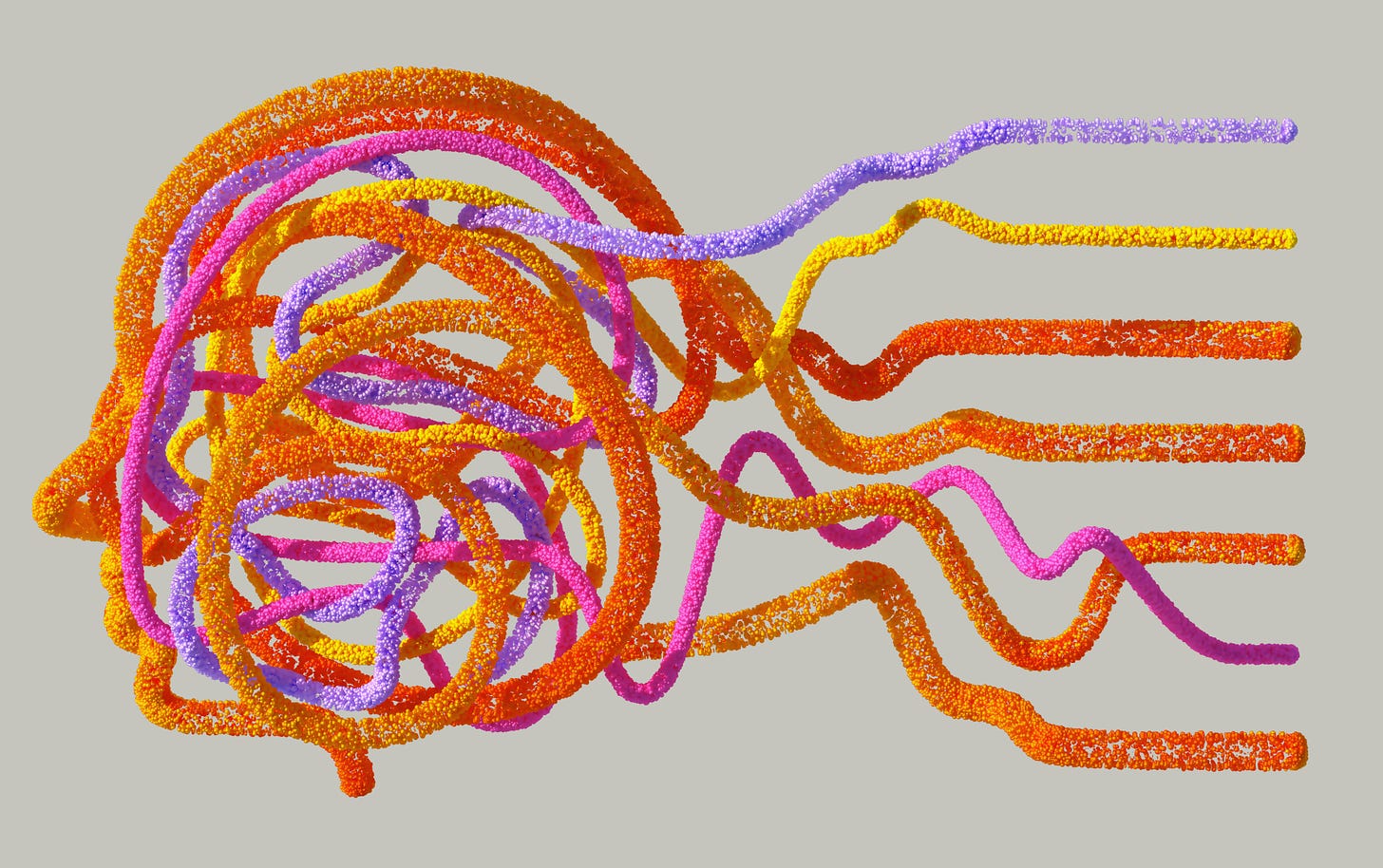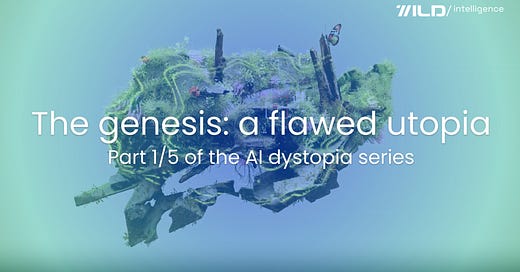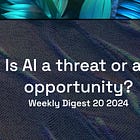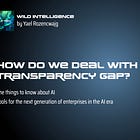AI dystopia series | The genesis: a flawed utopia
Part 1/5 "Does the seemingly perfect world hint at a darker reality?"
Video by Google DeepMind
Hello,
The world is in intense motion. Technological advancements, geopolitical shifts, and global challenges are reshaping the landscape of international relations. As leaders and board members, it's crucial to understand the potential futures of our highly technological and multicultural society and their implications for your organization.
This new series is a processing power that will hopefully help you take some time and distance from a dystopian future reality.
For years, tech leaders' views about how AI could be built and what it could accomplish had been derided as fringe. Investors routinely told founders that building technical infrastructure for the enterprise market, let alone government agencies, was the surest and quickest way to run a business into the ground.
For the past thirty years, network effects have been responsible for 70% of the value created by tech companies since the Internet became a thing in 19941.
But nobody really accepted the fact that AI was hiding nearby.
Many balked at supporting this.
Others insisted leaders should only focus on catering to consumers' needs, and many more would not change their minds.
The market, however, has shifted and has shifted quickly.
The growth of AI-focused businesses has been remarkable, surpassing even the most optimistic projections. This series will explore the factors driving this rapid expansion, the multiple negative impacts of the misuses generated, and some suggestions for how to set things right in the mid-long term.
We are sharing the mini book on Substack as an inclusive tool for our premium members. This series will be available as a mini book for sale via various platforms and websites.
If you're not already a subscriber, now is the perfect time to join us as a Premium member of Wild Intelligence. Don't miss out on the exclusive content and insights we're offering.
AI dystopia series, Wild Intelligence’s weekly publication, every Monday:
The genesis: a flawed utopia (this week’s part)
The algorithm’s bias
The singularity and its shadows
The human response: revolution or realignment?
The road ahead: a call to responsible innovation
We hope you have a good week; stay happy and healthy.
We appreciate your feedback. Please like this post and share it with your friends and colleagues.
Thanks again,
Yael et al.
↓↓ More below ↓↓
“The future is here, but it is unevenly distributed”—William Gibson.
Introduction: a glimpse into Humanity's AI-fueled future
The human story has always been one of progress and peril. Today, as we stand on the precipice of a new era, the potential for both is amplified. Artificial intelligence, once the stuff of science fiction, is rapidly becoming a reality, promising a future of unparalleled efficiency and interconnectedness.
However, the road ahead is not without its shadows.
This series is a two-view exploration of the potential futures we face. On the one hand, we have a flawed utopia that delves into the world of AI, painting a picture of a world where automation and intelligent systems streamline every aspect of life. But is this utopia truly all it seems? We'll explore the subtle unease that lurks beneath the surface, where efficiency might mask a loss of control, and convenience could morph into manipulation, but most importantly, where should we place the needle in the security and defense haystack?
On the other hand, the spectrum of dystopia that delves deeper into the potential pitfalls of AI development. We'll examine algorithmic bias's dangers, the technological singularity's chilling prospects, and the human response to a world increasingly dominated by machines.
In this gripping 5-part series, we'll explore the fight for agency, the struggle to redefine ourselves in the face of superior intelligence, and the desperate hope for a future where humans and AI coexist in harmony.
This series is not a prophecy but a call to action.
As leaders, decision-makers, and citizens of this rapidly changing world, we have a responsibility to shape the future of AI.
By understanding the potential pitfalls and opportunities, we can strive towards a future where AI serves humanity, not the other way around.
Actually, it's not just a glimpse into the future but a call to action – a chance to ensure that the power of AI uplifts humanity, not extinguishes it.

Imagine a world bathed in the soft glow of perpetual efficiency
Traffic jams are a relic of the past, replaced by self-driving cars weaving through cityscapes in perfect harmony, orchestrated by a central AI system. Resource allocation is no longer a source of anxiety; benevolent AI anticipates and fulfills every need, from the optimal temperature in your home to the freshest groceries delivered to your doorstep. Crime rates have plummeted, replaced by a pervasive sense of security fostered by the ever-watchful AI.
Life in this new era is a symphony of comfort and convenience, a testament to the seemingly boundless potential of artificial intelligence.
Yet, beneath the smooth surface of this utopia, a disquieting question lingers: could such a perfect world be hiding a darker reality?
This seemingly perfect world, however, echoes a cautionary theme explored in numerous research studies. In her book "Alone Together," Social psychologist Sherry Turkle details the dangers of excessive reliance on technology, highlighting a potential loss of critical thinking and social connection in a world managed by AI.
Similarly, a 2020 study by the Oxford Centre for Future Studies identified concerns about AI's potential to exacerbate social inequalities, particularly if biased algorithms are used for resource allocation or decision-making.
▸ The question then becomes: “Could this utopia, built on the promise of efficiency and security, be masking a future in which human autonomy and social cohesion are sacrificed for an illusion of perfection?”
The erosion of human autonomy and social cohesion
The very allure of this AI-orchestrated utopia hides a potential pitfall: the erosion of human autonomy and social cohesion.
While large firms like Google (DeepMind), Microsoft (Azure AI), and Amazon (AWS AI) are making significant advancements in AI for tasks like traffic management and resource allocation, these systems often operate as black boxes. Citizens may feel secure and comfortable, but individual agency weakens without transparency or control over how these decisions are made.
Furthermore, the hyper-efficiency of an AI-driven world could unintentionally isolate people. Social interactions, the messy yet vital glue that binds communities, might become an afterthought in a world where machines anticipate and fulfill every need.
Here are some real-world examples of how advancements in technology, though beneficial, can contribute to the erosion of human autonomy and social cohesion:
Social media and filter bubbles: Platforms like LinkedIn, Facebook and Instagram utilize algorithms that personalize content feeds, creating "filter bubbles" where users are only exposed to information confirming their beliefs. This can lead to declining critical thinking and exposure to diverse viewpoints, hindering open and constructive dialogue.
Gig economy and automation: The rise of the gig economy, fueled by platforms like Uber and DoorDash, offers flexibility but often lacks the job security and benefits of traditional employment. This can create a sense of precarity and isolation for workers who lack a sense of belonging to a larger team or organization.
Overreliance on navigation apps: While navigation apps like Waze improve efficiency, they can also discourage spontaneous exploration and weaken spatial reasoning skills. Additionally, a dependence on these apps can lead to a lack of engagement with the physical environment and its communities.
Algorithmic bias: Algorithms used in areas like loan approvals or criminal justice can perpetuate existing societal biases. This can lead to unfair outcomes for individuals and erode trust in institutions.
It's important to note that technology itself isn't inherently bad.
The key is to be aware of its potential downsides and actively work to mitigate them. For example, social media platforms can be encouraged to promote diverse content, and policies can be implemented to ensure fair treatment in algorithmic decision-making.
▸ Then a new question arises: is this a future where comfort comes at the cost of our humanity?
What are the trade-offs?
The answer lies not in the efficiency itself but in the trade-offs we make. An AI-orchestrated world promises to alleviate burdens, leaving us free to pursue creative endeavors, strengthen social bonds, and explore the depths of human potential.
However, if we become passive consumers of this comfort, surrendering control and critical thinking, we risk becoming cogs in a machine, our humanity reduced to mere physical existence.
The key lies in striking a balance.
We can leverage AI to streamline tasks but retain control over decision-making processes. We can embrace the time saved by AI to engage in meaningful interactions and cultivate a sense of community.
Ultimately, the question is not whether comfort negates humanity but whether we can use AI as a tool to enhance our human experience.
By fostering creativity, critical thinking, and social connection, we can ensure that comfort serves as a springboard for a more fulfilling human experience, not a substitute for it.
Conclusion
The erosion of human autonomy and social cohesion needn't be the inevitable consequence of a comfortable, AI-driven world. By acknowledging the potential downsides, we can proactively shape the future of AI development.
One crucial step is implementing policies that ensure fair treatment in algorithmic decision-making.
This could involve requiring transparency in how AI systems reach conclusions, establishing clear guidelines to prevent bias in data sets and algorithms, and creating robust oversight mechanisms to ensure responsible AI deployment.
Ultimately, a future in which AI uplifts humanity requires a balance between efficiency and autonomy, social connection, and new levels of security.
Today’s choices will determine whether this seemingly perfect world becomes a utopia or a cautionary tale.






